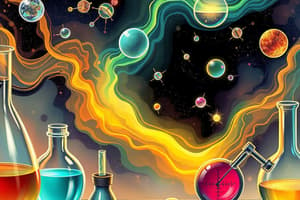Podcast
Questions and Answers
What is the systematic approach to research in chemistry called?
What is the systematic approach to research in chemistry called?
- Hypothesis testing
- The scientific method (correct)
- Theory development
- Experimental design
Which of the following is NOT an example of chemistry’s impact on health and medicine?
Which of the following is NOT an example of chemistry’s impact on health and medicine?
- Vaccines
- Gene therapy
- Wind energy (correct)
- Surgery with anesthesia
What distinguishes a substance from a mixture?
What distinguishes a substance from a mixture?
- Mixtures do not occupy space
- A substance has a definite composition and distinct properties (correct)
- A mixture always has a uniform composition
- A substance has variable composition
Which of the following is a homogenous mixture?
Which of the following is a homogenous mixture?
Which of the following represents a chemical change?
Which of the following represents a chemical change?
What is an element?
What is an element?
Which is an extensive property?
Which is an extensive property?
What is the SI unit of mass?
What is the SI unit of mass?
Which statement about mass and weight is correct?
Which statement about mass and weight is correct?
What unit represents volume in the International System of Units (SI)?
What unit represents volume in the International System of Units (SI)?
How is density calculated?
How is density calculated?
What is the density of a substance with a mass of 90 g and a volume of 30 mL?
What is the density of a substance with a mass of 90 g and a volume of 30 mL?
Which temperature conversion is accurate for Celsius to Kelvin?
Which temperature conversion is accurate for Celsius to Kelvin?
In scientific notation, how is the number 1,000,000 expressed?
In scientific notation, how is the number 1,000,000 expressed?
What is the significance of significant figures in measurements?
What is the significance of significant figures in measurements?
What is the main difference between accuracy and precision in scientific terms?
What is the main difference between accuracy and precision in scientific terms?
Study Notes
Systematic Research in Chemistry
- The systematic approach to research is called the scientific method.
- It involves hypothesis formulation, experimentation, observation, and conclusion.
Chemistry's Impact on Health and Medicine
- Examples of chemistry's influence include vaccines, gene therapy, and surgery with anesthesia.
- Wind energy is not related to chemistry's impact on health.
Understanding Hypotheses
- A hypothesis is a tentative explanation for a set of observations.
Definition of Matter
- Matter is defined as anything that has mass and occupies space.
Distinction Between Substances and Mixtures
- A substance has a definite composition and distinct properties, unlike mixtures.
Homogeneous Mixtures
- An example of a homogeneous mixture is salt dissolved in water.
Separation of Mixtures
- Mixtures can be separated into components by physical means.
Elements and Compounds
- An element cannot be separated into simpler substances by chemical methods.
- An example of a compound is quartz.
Chemical Changes
- Hydrogen burning in air to form water signifies a chemical change.
Properties of Matter
- Extensive properties, such as volume, depend on the amount of substance present.
SI Units
- The SI unit of mass is the kilogram.
- The SI unit for volume is the cubic meter.
Relationship Between Mass and Weight
- Weight is the force that gravity exerts on an object's mass, differing from mass, which remains constant regardless of gravity.
Density Calculations
- Density is calculated using the formula mass/volume.
- A substance with a mass of 45 g and a volume of 15 mL has a density of 3 g/mL.
Temperature Conversions
- 0°C is equivalent to 273 K.
- 172.9°F converts approximately to 78.3°C.
Scientific Notation
- 602,200,000,000,000,000,000,000 atoms in scientific notation is expressed as 6.022 × 10²³.
Significant Figures
- Significant figures indicate the accuracy of measurements.
- The number 0.00420 has 3 significant figures.
- In addition, the answer must reflect the same number of decimal places as the measurement with the least decimal places.
Accuracy vs Precision
- Accuracy refers to how close a measurement is to the true value.
- Precision indicates how close multiple measurements are to each other.
Dimensional Analysis
- Dimensional analysis is useful in solving problems by converting units and ensuring consistent measurements.
Studying That Suits You
Use AI to generate personalized quizzes and flashcards to suit your learning preferences.
Description
Test your knowledge on the systematic approach to research in chemistry and its applications in health and medicine. This quiz covers key concepts such as the scientific method, hypothesis, and real-world impacts of chemistry. See how well you understand the foundational principles of chemistry!




